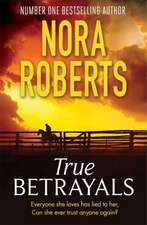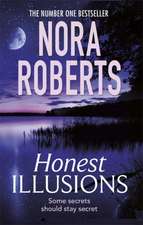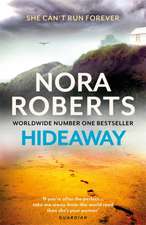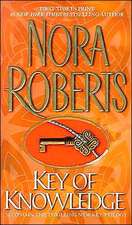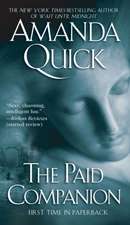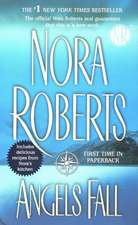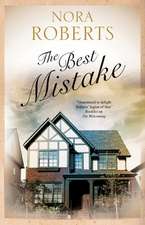The Hollow: Sign of Seven Trilogy
Autor Nora Robertsen Limba Engleză Paperback – 3 noi 2016
| Toate formatele și edițiile | Preț | Express |
|---|---|---|
| Paperback (3) | 49.27 lei 3-5 săpt. | +25.65 lei 6-12 zile |
| Little Brown Book Group – 3 noi 2016 | 49.27 lei 3-5 săpt. | +25.65 lei 6-12 zile |
| Penguin Books – 30 apr 2008 | 57.30 lei 3-5 săpt. | |
| Penguin Publishing Group – 23 apr 2019 | 93.00 lei 3-5 săpt. |
Preț: 49.27 lei
Preț vechi: 64.01 lei
-23% Nou
Puncte Express: 74
Preț estimativ în valută:
9.43€ • 10.08$ • 7.86£
9.43€ • 10.08$ • 7.86£
Carte disponibilă
Livrare economică 27 martie-10 aprilie
Livrare express 12-18 martie pentru 35.64 lei
Preluare comenzi: 021 569.72.76
Specificații
ISBN-13: 9780349412283
ISBN-10: 0349412286
Pagini: 336
Dimensiuni: 128 x 196 x 24 mm
Greutate: 0.27 kg
Editura: Little Brown Book Group
Seria Sign of Seven Trilogy
ISBN-10: 0349412286
Pagini: 336
Dimensiuni: 128 x 196 x 24 mm
Greutate: 0.27 kg
Editura: Little Brown Book Group
Seria Sign of Seven Trilogy
Notă biografică
Nora Roberts is the number one New York Times bestseller of more than 200 novels. With over 500 million copies of her books in print, she is indisputably one of the most celebrated and popular writers in the world. She is both a Sunday Times bestseller in the UK and a number one bestseller in Australia.
Extras
Prologue
Hawkins Hollow
June, 1994
On a bright summer morning, a teacup poodle drowned in the Bestlers’ backyard swimming pool. At first Lynne Bestler, who'd gone out to sneak in a solitary swim before her kids woke, thought it was a dead squirrel. Which would've been bad enough. But when she steeled herself to scoop out the tangle of fur with the net, she recognized her neighbor’s beloved Marcell.
Squirrels generally didn’t wear rhinestone collars.
Her shouts, and the splash as Lynne tossed the hapless dog, net and all, back into the pool, brought Lynne’s husband rushing out in his boxers. Their mother’s sobs, and their father’s curses as he jumped in to grab the pole and tow the body to the side, woke the Bestler twins, who stood screaming in their matching My Little Pony nightgowns. Within moments, the backyard hysteria had neighbors hurrying to fences just as Bestler dragged himself and his burden out of the water. As, like many men, Bestler had developed an attachment to ancient underwear, the weight of the water was too much for the worn elastic.
So Bestler came out of his pool with a dead dog, and no boxers. The bright summer morning in the little town of Hawkins Hollow began with shock, grief, farce, and drama.
Fox learned of Marcell’s untimely death minutes after he stepped into Ma’s Pantry to pick up a sixteen-ounce bottle of Coke and a couple of Slim Jims.
He’d copped a quick break from working with his father on a kitchen remodel down Main Street. Mrs. Larson wanted new countertops, cabinet doors, new floors, new paint. She called it freshening things up, and Fox called it a way to earn enough money to take Allyson Brendon out for pizza and the movies on Saturday night. He hoped to use that gateway to talk her into the backseat of his ancient VW bug.
He didn’t mind working with his dad. He hoped to hell he wouldn’t spend the rest of his life swinging a hammer or running a power saw, but he didn’t mind it. His father’s company was always easy, and the job got Fox out of gardening and animal duty on their little farm. It also provided easy access to Cokes and Slim Jims—two items that would never, never be found in the O’Dell-Barry household.
His mother ruled there.
So he heard about the dog from Susan Keefaffer, who rang up his purchases while a few people with nothing better to do on a June afternoon sat at the counter over coffee and gossip.
He didn’t know Marcell, but Fox had a soft spot for animals, so he suffered a twist of grief for the unfortunate poodle. That was leavened somewhat by the idea of Mr. Bestler, whom he did know, standing “naked as a jaybird,” in Susan Keefaffer’s words, beside his backyard pool.
While it made Fox sad to imagine some poor dog drowning in a swimming pool, he didn’t connect it—not then—to the nightmare he and his two closest friends had lived through seven years before.
He’d had a dream the night before, a dream of blood and fire, of voices chanting in a language he didn’t understand. But then he’d watched a double feature of videos—Night of the Living Dead and The Texas Chainsaw Massacre—with his friends Cal and Gage. He didn’t connect a dead French poodle with the dream, or with what had burned through Hawkins Hollow for a week after his tenth birthday. After the night he and Cal and Gage had spent at the Pagan Stone in Hawkins Wood—and everything had changed for them, and for the Hollow.
In a few weeks he and Cal and Gage would all turn seventeen, and that was on his mind. Baltimore had a damn good chance at a pennant this year, so that was on his mind. He’d be going back to high school as a senior, which meant top of the food chain at last, and planning for college.
What occupied a sixteen-year-old boy was considerably different than what occupied a ten-year-old. Including rounding third and heading for home with Allyson Brendon. So when he walked back down the street, a lean boy not quite beyond the gangly stage of adolescence, his dense brown hair tied back in a stubby tail, golden brown eyes shaded with Oakleys, it was, for him, just another ordinary day.
The town looked as it always did. Tidy, a little old-timey, with the old stone townhouses or shops, the painted porches, the high curbs. He glanced back over his shoulder toward the Bowl-a-Rama on the Square. It was the biggest building in town, and where Cal and Gage were both working.
When he and his father knocked off for the day, he thought he’d head on up, see what was happening.
He crossed over to the Larson place, walked into the unlocked house where Bonnie Raitt’s smooth Delta Blues slid smoothly out of the kitchen. His father sang along with her in his clear and easy voice as he checked the level on the shelves Mrs. Larson wanted in her utility closet. Though the windows and back door were open to their screens, the room smelled of sawdust, sweat, and the glue they’d used that morning to install the new Formica.
His father worked in old Levi’s and his Give Peace a Chance T-shirt. His hair was six inches longer than Fox’s, worn in a tail under a blue bandanna. He’d shaved off the beard and moustache he’d had as long as Fox remembered. Fox still wasn’t quite used to seeing so much of his father’s face—or so much of himself in it.
“A dog drowned in the Bestler’s swimming pool over on Laurel Lane,” Fox told him, and Brian stopped working to turn.
“That’s a damn shame. Anybody know how it happened?”
“Not really. It was one of those little poodles, so think it must’ve fallen in, then it couldn’t get out again.”
“You’d think somebody would’ve heard it barking. That’s a lousy way to go.” Brian set down his tools, smiled at his boy. “Gimme one of those Slim Jims.”
“What Slim Jims?”
“The ones you’ve got in your back pocket. You’re not carrying a bag, and you weren’t gone long enough to scarf down Hostess Pies or Twinkies. I’m betting you’re packing the Jims. I get one, and your mom never has to know we ate chemicals and meat by-products. It’s called blackmail, kid of mine.”
Fox snorted, pulled them out. He’d bought two for just this purpose. Father and son unwrapped, bit off, chewed in perfect harmony. “The counter looks good, Dad.”
“Yeah, it does.” Brian ran a hand over the smooth, eggshell surface. “Mrs. Larson’s not much for color, but it’s good work. I don’t know who I’m going to get to be my lapdog when you head off to college.”
“Ridge is next in line,” Fox said, thinking of his younger brother.
“Ridge wouldn’t keep measurements in his head for two minutes running, and he’d probably cut off a finger dreaming while he was using a band saw. No.” Brian smiled, shrugged. “This kind of work isn’t for Ridge, or for you, for that matter. Or either of your sisters. I guess I’m going to have to rent a kid to get one who wants to work with wood.”
“I never said I didn’t want to.” Not out loud.
His father looked at him the way he sometimes did, as if he saw more than what was there. “You’ve got a good eye, you’ve got good hands. You’ll be handy around your own house once you get one. But you won’t be strapping on a tool belt to make a living. Until you figure out just what it is you want, you can haul these scraps on out to the Dumpster.”“Sure.” Fox gathered up scraps, trash, began to cart them out the back, across the narrow yard to the Dumpster the Larsons had rented for the duration of the remodel.He glanced toward the adjoining yard and the sound of kids playing. And the armload he carried thumped and bounced on the ground as his body went numb.The little boys played with trucks and shovels and pails in a bright blue sandbox. But it wasn’t filled with sand. Blood covered their bare arms as they pushed their Tonka trucks through the muck inside the box. He stumbled back as the boys made engine sounds, as red lapped over the bright blue sides and dripped onto the green grass.On the fence between the yards, where hydrangeas headed up toward bloom, crouched a boy that wasn’t a boy. It bared its teeth in a grin as Fox backed toward the house.“Dad! Dad!”The tone, the breathless fear had Brian rushing outside. “What? What is it?” “Don’t you—can't you see?” But even as he said it, as he pointed, something inside Fox knew. It wasn’t real. “What?” Firmly now, Brian took his son’s shoulders. “What do you see?” The boy that wasn’t a boy danced along the top of the chain-link fence while flames spurted up below and burned the hydrangeas to cinders. “I have to go. I have to go see Cal and Gage. Right now, Dad. I have to—” “Go.” Brian released his hold on Fox, stepped back. He didn’t question. “Go.” He all but flew through the house and out again, up the sidewalk to the Square. The town no longer looked as it usually did to him. In his mind’s eye Fox could see it as it had been that horrible week in July seven years before.
Fire and blood, he remembered, thinking of the dream.
He burst into the Bowl-a-Rama where the summer afternoon leagues were in full swing. The thunder of balls, the crash of pins pounded in his head as he ran straight to the front desk where Cal worked.
“Where’s Gage?” Fox demanded.
“Jesus, what’s up with you?”
“Where’s Gage?” Fox repeated, and Cal’s amused gray eyes sobered. “Working the arcade. He’s . . . he’s coming out now.”
At Cal’s quick signal, Gage sauntered over. “Hello, ladies. What . . .” The smirk died after one look at Fox’s face. “What happened?”
“It’s back,” Fox said. “It’s come back.”
Hawkins Hollow
June, 1994
On a bright summer morning, a teacup poodle drowned in the Bestlers’ backyard swimming pool. At first Lynne Bestler, who'd gone out to sneak in a solitary swim before her kids woke, thought it was a dead squirrel. Which would've been bad enough. But when she steeled herself to scoop out the tangle of fur with the net, she recognized her neighbor’s beloved Marcell.
Squirrels generally didn’t wear rhinestone collars.
Her shouts, and the splash as Lynne tossed the hapless dog, net and all, back into the pool, brought Lynne’s husband rushing out in his boxers. Their mother’s sobs, and their father’s curses as he jumped in to grab the pole and tow the body to the side, woke the Bestler twins, who stood screaming in their matching My Little Pony nightgowns. Within moments, the backyard hysteria had neighbors hurrying to fences just as Bestler dragged himself and his burden out of the water. As, like many men, Bestler had developed an attachment to ancient underwear, the weight of the water was too much for the worn elastic.
So Bestler came out of his pool with a dead dog, and no boxers. The bright summer morning in the little town of Hawkins Hollow began with shock, grief, farce, and drama.
Fox learned of Marcell’s untimely death minutes after he stepped into Ma’s Pantry to pick up a sixteen-ounce bottle of Coke and a couple of Slim Jims.
He’d copped a quick break from working with his father on a kitchen remodel down Main Street. Mrs. Larson wanted new countertops, cabinet doors, new floors, new paint. She called it freshening things up, and Fox called it a way to earn enough money to take Allyson Brendon out for pizza and the movies on Saturday night. He hoped to use that gateway to talk her into the backseat of his ancient VW bug.
He didn’t mind working with his dad. He hoped to hell he wouldn’t spend the rest of his life swinging a hammer or running a power saw, but he didn’t mind it. His father’s company was always easy, and the job got Fox out of gardening and animal duty on their little farm. It also provided easy access to Cokes and Slim Jims—two items that would never, never be found in the O’Dell-Barry household.
His mother ruled there.
So he heard about the dog from Susan Keefaffer, who rang up his purchases while a few people with nothing better to do on a June afternoon sat at the counter over coffee and gossip.
He didn’t know Marcell, but Fox had a soft spot for animals, so he suffered a twist of grief for the unfortunate poodle. That was leavened somewhat by the idea of Mr. Bestler, whom he did know, standing “naked as a jaybird,” in Susan Keefaffer’s words, beside his backyard pool.
While it made Fox sad to imagine some poor dog drowning in a swimming pool, he didn’t connect it—not then—to the nightmare he and his two closest friends had lived through seven years before.
He’d had a dream the night before, a dream of blood and fire, of voices chanting in a language he didn’t understand. But then he’d watched a double feature of videos—Night of the Living Dead and The Texas Chainsaw Massacre—with his friends Cal and Gage. He didn’t connect a dead French poodle with the dream, or with what had burned through Hawkins Hollow for a week after his tenth birthday. After the night he and Cal and Gage had spent at the Pagan Stone in Hawkins Wood—and everything had changed for them, and for the Hollow.
In a few weeks he and Cal and Gage would all turn seventeen, and that was on his mind. Baltimore had a damn good chance at a pennant this year, so that was on his mind. He’d be going back to high school as a senior, which meant top of the food chain at last, and planning for college.
What occupied a sixteen-year-old boy was considerably different than what occupied a ten-year-old. Including rounding third and heading for home with Allyson Brendon. So when he walked back down the street, a lean boy not quite beyond the gangly stage of adolescence, his dense brown hair tied back in a stubby tail, golden brown eyes shaded with Oakleys, it was, for him, just another ordinary day.
The town looked as it always did. Tidy, a little old-timey, with the old stone townhouses or shops, the painted porches, the high curbs. He glanced back over his shoulder toward the Bowl-a-Rama on the Square. It was the biggest building in town, and where Cal and Gage were both working.
When he and his father knocked off for the day, he thought he’d head on up, see what was happening.
He crossed over to the Larson place, walked into the unlocked house where Bonnie Raitt’s smooth Delta Blues slid smoothly out of the kitchen. His father sang along with her in his clear and easy voice as he checked the level on the shelves Mrs. Larson wanted in her utility closet. Though the windows and back door were open to their screens, the room smelled of sawdust, sweat, and the glue they’d used that morning to install the new Formica.
His father worked in old Levi’s and his Give Peace a Chance T-shirt. His hair was six inches longer than Fox’s, worn in a tail under a blue bandanna. He’d shaved off the beard and moustache he’d had as long as Fox remembered. Fox still wasn’t quite used to seeing so much of his father’s face—or so much of himself in it.
“A dog drowned in the Bestler’s swimming pool over on Laurel Lane,” Fox told him, and Brian stopped working to turn.
“That’s a damn shame. Anybody know how it happened?”
“Not really. It was one of those little poodles, so think it must’ve fallen in, then it couldn’t get out again.”
“You’d think somebody would’ve heard it barking. That’s a lousy way to go.” Brian set down his tools, smiled at his boy. “Gimme one of those Slim Jims.”
“What Slim Jims?”
“The ones you’ve got in your back pocket. You’re not carrying a bag, and you weren’t gone long enough to scarf down Hostess Pies or Twinkies. I’m betting you’re packing the Jims. I get one, and your mom never has to know we ate chemicals and meat by-products. It’s called blackmail, kid of mine.”
Fox snorted, pulled them out. He’d bought two for just this purpose. Father and son unwrapped, bit off, chewed in perfect harmony. “The counter looks good, Dad.”
“Yeah, it does.” Brian ran a hand over the smooth, eggshell surface. “Mrs. Larson’s not much for color, but it’s good work. I don’t know who I’m going to get to be my lapdog when you head off to college.”
“Ridge is next in line,” Fox said, thinking of his younger brother.
“Ridge wouldn’t keep measurements in his head for two minutes running, and he’d probably cut off a finger dreaming while he was using a band saw. No.” Brian smiled, shrugged. “This kind of work isn’t for Ridge, or for you, for that matter. Or either of your sisters. I guess I’m going to have to rent a kid to get one who wants to work with wood.”
“I never said I didn’t want to.” Not out loud.
His father looked at him the way he sometimes did, as if he saw more than what was there. “You’ve got a good eye, you’ve got good hands. You’ll be handy around your own house once you get one. But you won’t be strapping on a tool belt to make a living. Until you figure out just what it is you want, you can haul these scraps on out to the Dumpster.”“Sure.” Fox gathered up scraps, trash, began to cart them out the back, across the narrow yard to the Dumpster the Larsons had rented for the duration of the remodel.He glanced toward the adjoining yard and the sound of kids playing. And the armload he carried thumped and bounced on the ground as his body went numb.The little boys played with trucks and shovels and pails in a bright blue sandbox. But it wasn’t filled with sand. Blood covered their bare arms as they pushed their Tonka trucks through the muck inside the box. He stumbled back as the boys made engine sounds, as red lapped over the bright blue sides and dripped onto the green grass.On the fence between the yards, where hydrangeas headed up toward bloom, crouched a boy that wasn’t a boy. It bared its teeth in a grin as Fox backed toward the house.“Dad! Dad!”The tone, the breathless fear had Brian rushing outside. “What? What is it?” “Don’t you—can't you see?” But even as he said it, as he pointed, something inside Fox knew. It wasn’t real. “What?” Firmly now, Brian took his son’s shoulders. “What do you see?” The boy that wasn’t a boy danced along the top of the chain-link fence while flames spurted up below and burned the hydrangeas to cinders. “I have to go. I have to go see Cal and Gage. Right now, Dad. I have to—” “Go.” Brian released his hold on Fox, stepped back. He didn’t question. “Go.” He all but flew through the house and out again, up the sidewalk to the Square. The town no longer looked as it usually did to him. In his mind’s eye Fox could see it as it had been that horrible week in July seven years before.
Fire and blood, he remembered, thinking of the dream.
He burst into the Bowl-a-Rama where the summer afternoon leagues were in full swing. The thunder of balls, the crash of pins pounded in his head as he ran straight to the front desk where Cal worked.
“Where’s Gage?” Fox demanded.
“Jesus, what’s up with you?”
“Where’s Gage?” Fox repeated, and Cal’s amused gray eyes sobered. “Working the arcade. He’s . . . he’s coming out now.”
At Cal’s quick signal, Gage sauntered over. “Hello, ladies. What . . .” The smirk died after one look at Fox’s face. “What happened?”
“It’s back,” Fox said. “It’s come back.”



